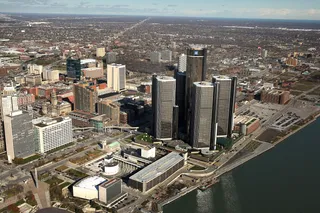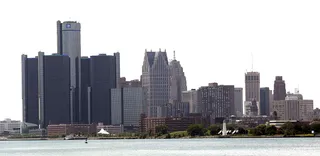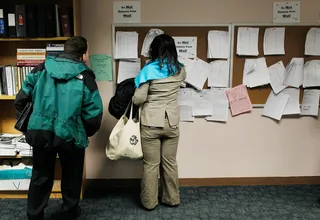Detroit: By the Numbers
A snapshot of Detroit's financial and residential outlook.

1 / 9
A Historic Move - Becoming the largest city to file for bankruptcy in U.S. history on Thursday, Detroit set a course toward financial rehabilitation, but what will its Chapter 9 filing mean for the people of Detroit and city as a whole? BET.com takes a closer look. —Britt Middleton (Photo: Spencer Platt/Getty Images)
Photo By Spencer Platt/Getty Images

2 / 9
701,475 - The estimated population of Detroit in 2012. African-American make up 10.6 percent of the city's population and 14.2 percent of Michigan's overall population, according to the U.S. Census Bureau. It is merely a shadow of the 1.8 million residents who called the Motor City home back in 1950. (Photo: Spencer Platt/Getty Images)

3 / 9
250,000 - Despite being the 11th largest city in the United States, Detroit lost 250,000 residents between 2000 and 2010, the Associated Press reports. In a city already reeling from the collapse and federal bailout of America's top three automakers, the apparent exodus triggered a steep decrease in bankable tax revenues and caused home values to plummet in recent years. (Photo: Bill Pugliano/Getty Images)

4 / 9
10,000 - The approximate number of people employed by the city. The city has relied on state-backed bond money in recent months to make payroll. (Photo: Keystone/Getty Images)

5 / 9
$380 Million - The estimated number of the city’s budget deficit. According to Detroit Emergency Manager Kevyn Orr, the city's long-term debt spans anywhere from $14 billion to $20 billion. (Photo: AP Photo/Paul Sancya, File)
ADVERTISEMENT

6 / 9
10 Cents - The amount some creditors, along with the city's pension and union boards, were asked to take on the dollar for what the city owed to them, according to Orr's financial report to creditors issued in June. (Photo: Bill Pugliano/Getty Images)
Photo By Bill Pugliano/Getty Images

7 / 9
9.4 Percent - The unemployment rate of Detroit and metropolitan area as of June 2013, a slight decrease from the same time last year (10.6 percent), according to a report from the Michigan Department of Technology, Management & Budget, released July 17. (Photo: Chris Hondros/Getty Images)
Photo By Chris Hondros/Getty Images

8 / 9
18.7 Percent - The African-American unemployment rate in Michigan through the fourth quarter of 2012, compared to 7.5 percent for whites, a May 2013 report by the Economic Policy Institute found. (Photo: AP Photo/John Bazemore)
